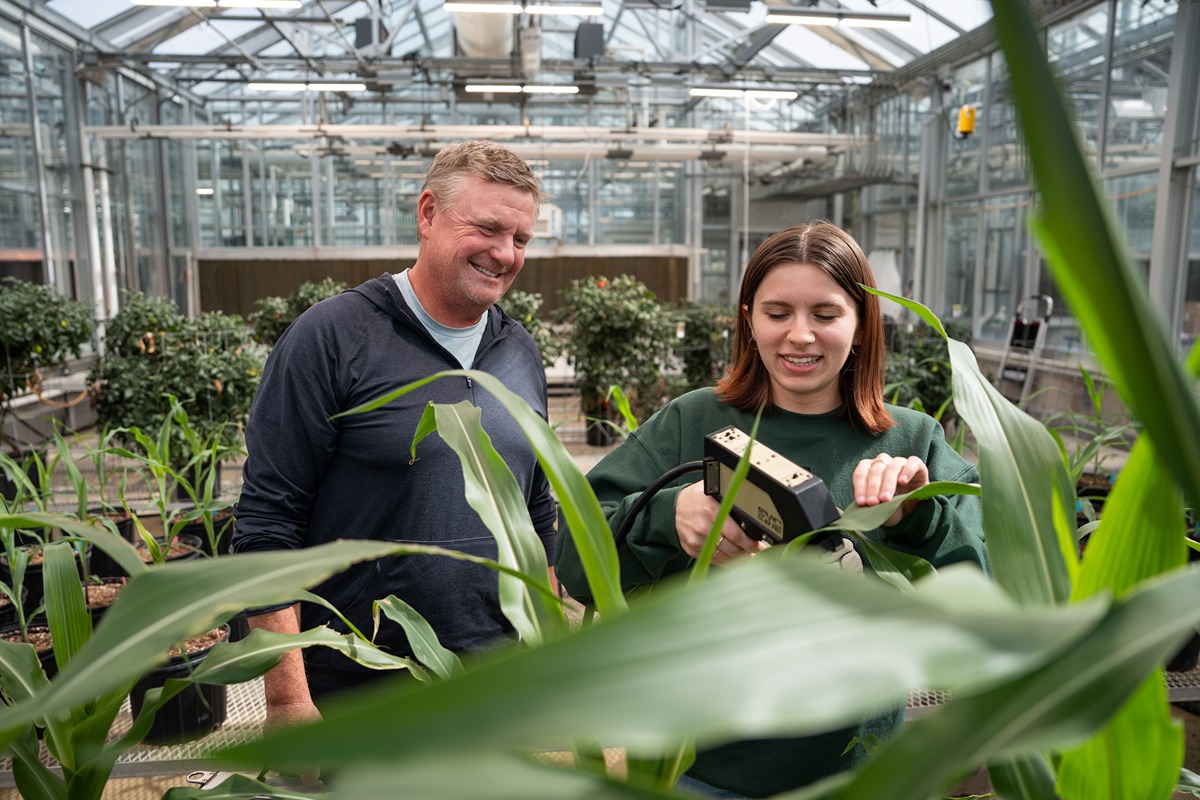Purdue leads international effort to decode drought-resistant corn
A dry season can be devastating to harvests, putting both farmers' livelihoods and communities' food security at risk. Identifying the traits that make crops more drought-resistant is critical for developing hardier hybrids.
Researchers at Purdue University's College of Agriculture are using cutting-edge technology and international partnerships to determine what makes certain varieties of corn more resilient than others.
With Michael Mickelbart, professor of botany and horticulture, as principal investigator, the project brings together researchers from the United States, Germany and the United Kingdom.
“Corn is one of the world’s most important crops. We know hybrids differ in yield stability, but we don't know why,” Mickelbart said. “Our goal is to identify traits that make plants more climate-stable.”
The new project builds on previous research by Mickelbart and Mitchell Tuinstra, professor of plant breeding and genetics, extending their work on yield stability to better understand what makes certain types of corn thrive in challenging environments.
Supported by grant funding from the U.S. National Science Foundation (NSF) and trustee investment in Purdue’s Institute for Plant Sciences, the team is analyzing roughly 300 maize hybrids to identify the physiological traits linked to resilience.
“These hybrids represent commercial corn in the U.S.,” said Tuinstra, scientific director at the Institute for Plant Sciences and Wickersham Chair of Excellence in Agricultural Research. “We want to understand the biology of the adaptive characteristics behind productivity.”
Increased drought tolerance can result from many factors: some high-performing varieties might have better photosynthetic rates, while others might be better at extracting water from soil.
“There could be a hundred different traits; measuring them all with traditional methodology would take huge amounts of labor,” Mickelbart said. “One of the unique things about this project is we're using technology to predict many traits without measuring them individually.”
The solution lies in vegetation spectroscopy, an imaging technique that collects data from the interaction of light with plants. John Couture, associate professor of entomology, forestry and natural resources, leads this aspect of the project.
“We use light reflectance to infer physiochemical characteristics of the hybrids as they are growing,” Couture said. “With one measurement, you can estimate 50, 60 or even 70 traits non-destructively.”
Where scientists using traditional methods might be able to measure 100 plants in a day, Couture and the team use high-throughput phenotyping techniques to collect data from hundreds of plants in an hour. The approach scales from greenhouse to field thanks to investments in controlled environment phenotyping facilities, such as Purdue's Ag Alumni Seed Phenotyping Facility.
While the researchers at Purdue specialize in shoots — the above-ground features of the plants, including stems and leaves — international collaborators provide additional expertise.
“We're aligning three groups with different institutional strengths,” Tuinstra said. “They have capabilities and knowledge we don't have, and vice versa.”
Gabriel Castrillo, associate professor of plant microbiome at the University of Nottingham, will study the microbial interactions that take place in the plants and soil. Hannah Schneider, head of genetics and physiology of root development at the Leibniz Institute of Plant Genetics and Crop Plant Research in Gatersleben, Germany, is the project's expert on everything underground.
“We are excited to partner with this international team to tackle corn yield stability through a truly interdisciplinary approach,” said Schneider, who spent time at Purdue before moving to Europe. “This unique collaboration allows us to examine the shoots, roots and microbiome together for the first time.”
This summer, the Purdue researchers conducted experiments at the Agronomy Center for Research and Education (ACRE) and in the Horticulture and Landscape Architecture Plant Growth Facility.
The project includes work with industry partner Bayer Crop Sciences, which has headquarters in the U.S. and Germany and a collaboration office at Purdue's Convergence Center.
“Bayer is one of the largest corn breeding companies in the world, so this was a unique opportunity to connect with their German headquarters,” Tuinstra said.
In 2026, Purdue and Bayer will host an Innovation Bootcamp to train faculty and students to translate research into real-world applications. Nottingham and Gatersleben will host subsequent sessions.
With data collection complete and harvest underway, the Purdue team is preparing for analysis. Next year, the international partners will visit to collect data from similar trials while running parallel experiments in their home countries.
“We're fortunate to collaborate with some of the world's leading experts in plant science,” Tuinstra said. “They're not only top-caliber researchers, they're also people who have the same goal we do: to understand how to future-proof the crops we rely on for food and feed.”






